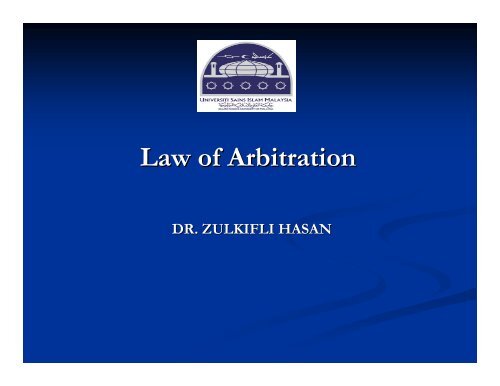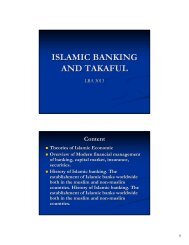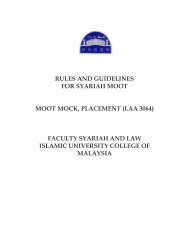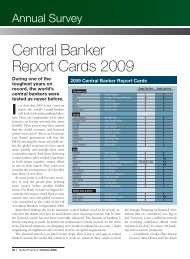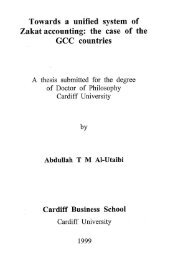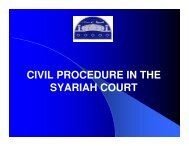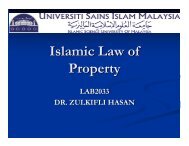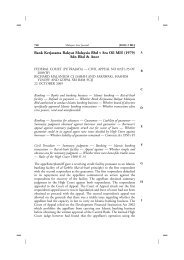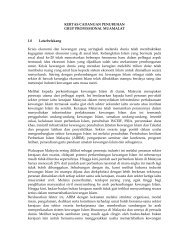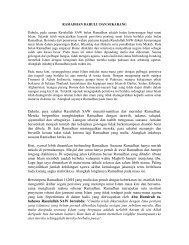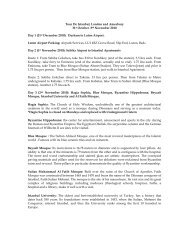Arbitration in Islamic Law
Arbitration in Islamic Law
Arbitration in Islamic Law
You also want an ePaper? Increase the reach of your titles
YUMPU automatically turns print PDFs into web optimized ePapers that Google loves.
<strong>Law</strong> of <strong>Arbitration</strong><br />
DR. ZULKIFLI HASAN
Content<br />
<strong>Arbitration</strong> In <strong>Islamic</strong> <strong>Law</strong>
Introduction<br />
Sulh is a settlement grounded upon compromise<br />
negotiated by the disputants themselves or with the<br />
help of a third party.<br />
Islam encourages parties to use sulh <strong>in</strong> order to resolve<br />
their disputes:<br />
‘reconciliation between them, and reconciliation is<br />
better’ Verse 128 Sura Nisa<br />
‘If two parties among the Believers fall <strong>in</strong>to a quarrel,<br />
make ye peace between them . . . make peace between<br />
them with justice, and be fair: For God loves those who<br />
are fair and just.’ Verse 9 <strong>in</strong> Sura AlHujurat
Sulh and <strong>Arbitration</strong><br />
Sulh<br />
An amicable settlement may be<br />
reached between the parties<br />
with or without the<br />
<strong>in</strong>volvement of others<br />
the agreement of sulh is not<br />
b<strong>in</strong>d<strong>in</strong>g<br />
can only be resorted<br />
to if the dispute has already<br />
occurred<br />
<strong>Arbitration</strong><br />
the appo<strong>in</strong>tment of a third party<br />
is<br />
<strong>in</strong>dispensable<br />
B<strong>in</strong>d<strong>in</strong>g<br />
arbitration can address both<br />
exist<strong>in</strong>g and prospective<br />
disputes
Mejelle<br />
S 1844: ‘should the parties have authorised the<br />
arbitrators…to conciliate them, the agreement<br />
of the arbitrators is deemed to be a<br />
compromise…which the parties must accept’ as<br />
if they had compromised themselves’.<br />
S 1847:‘if a third party settles a dispute without<br />
hav<strong>in</strong>g been entrusted with this mission by the<br />
parties, and if the latter accept his settlement,<br />
the award shall be enforced’.
TAHKIM /ARBITRATION<br />
<strong>Islamic</strong> law allows parties to submit<br />
to arbitration to resolve disputes<br />
relat<strong>in</strong>g to property / private rights<br />
matters<br />
In<br />
Quran<br />
surah<br />
4:35 and a Hadith<br />
narrated by Ibn Hajar:<br />
” They are 2 representatives who can<br />
only act upon consent given by the<br />
parties…”<br />
In Malaysia, Hakam is very relevant <strong>in</strong><br />
<strong>Islamic</strong> Family <strong>Law</strong> matters<br />
eg: : S.48 of IFLA (FT)
ROLE OF HAKAM<br />
Hakam should:<br />
i) act justly <strong>in</strong> judg<strong>in</strong>g disputes<br />
between two parties<br />
ii)<br />
iii)<br />
iv)<br />
advice disput<strong>in</strong>g parties on the<br />
teach<strong>in</strong>gs of Islam<br />
decide the dispute submitted to<br />
him<br />
decide the disputes accord<strong>in</strong>g<br />
to law
WHO IS A HAKAM<br />
an authorised person to dispose of rights, to<br />
settle differences between different persons<br />
by suggest<strong>in</strong>g settlement or help<strong>in</strong>g them to<br />
reach it, or by issu<strong>in</strong>g a b<strong>in</strong>d<strong>in</strong>g decision to<br />
settle the dispute<br />
middle man<br />
Representative appo<strong>in</strong>ted by the court to<br />
resolve serious disputes between husband<br />
and wife<br />
Accord<strong>in</strong>g to Fiqh dictionary, Hakam means<br />
person who has been assigned to resolve<br />
disputes between spouses
HISTORICAL BACKGROUND<br />
In the pre-<strong>Islamic</strong> era, if there were<br />
disputes which led to no result,<br />
recourse was normally had to an<br />
arbitrator (hakam(<br />
hakam)<br />
Arbitrator did not belong to a<br />
particular caste and parties were free<br />
to appo<strong>in</strong>t anyone whom they agreed<br />
An arbitrator was chosen for his<br />
personal qualities, reputation and<br />
usually belonged to a family famous<br />
for their competence <strong>in</strong> decid<strong>in</strong>g<br />
disputes
cont’d<br />
An arbitrator were also known for his<br />
supernatural powers, commonly<br />
found <strong>in</strong> soothsayers (kah<strong>in</strong>(<br />
kah<strong>in</strong>)<br />
Parties had to agree not only on the<br />
choice of arbitrator, but also the<br />
cause of action which they were to<br />
submit to him<br />
If the kah<strong>in</strong> agreed to act, each party<br />
had to provide a security (property)<br />
as a guarantee
cont’d<br />
that they would abide by his decision<br />
• The decision of hakam was f<strong>in</strong>al but it<br />
was not an enforceable judgment (it<br />
was only a statement of right on a<br />
disputed po<strong>in</strong>t)<br />
• However, it is said that the arbitral<br />
awards of the arbitrators appo<strong>in</strong>ted <strong>in</strong><br />
the ukaz (a fair held periodically <strong>in</strong><br />
Makkah) ) were customarily b<strong>in</strong>d<strong>in</strong>g on<br />
disputants
ARBITRATION<br />
A dispute between the sheikhs of<br />
Mecca over the plac<strong>in</strong>g of a holy black<br />
stoneBetween<br />
Ali and Mu’awiya<br />
Mu’awiya<br />
refused to submit to the caliphate<br />
of Ali which resulted <strong>in</strong>to the battle of Siff<strong>in</strong><br />
Dur<strong>in</strong>g the course of the battle, both parties<br />
wished that the matter could be settled<br />
through arbitration<br />
Each side nom<strong>in</strong>ated its arbitrator, Abu Musa<br />
represented Ali, Amar ibn Al-Aas<br />
Aas represented<br />
Mu’awiya
cont’d<br />
The arbitration agreement <strong>in</strong> the<br />
document conta<strong>in</strong>ed, place of<br />
arbitration, applicable law, rules of<br />
procedure, provision for the<br />
appo<strong>in</strong>tment of a substitute arbitrator<br />
if the one appo<strong>in</strong>ted died
QUALIFICATIONS OF<br />
ARBITRATOR<br />
Generally, he must possess the same<br />
qualifications as that of qadi namely:<br />
i)sane and adult<br />
ii)A A male (Hanafis(<br />
allow a woman also<br />
to act qadi <strong>in</strong> matters not <strong>in</strong>volv<strong>in</strong>g<br />
hadd and qisas)<br />
iii)A A Muslim (Hanafis(<br />
allow a non-<br />
Muslim to act as an arbitrator)
cont’d<br />
iv) He must be <strong>in</strong>telligent, free and adil<br />
v) He must be learned <strong>in</strong> Shariah<br />
vi)Family members (from the husband<br />
and wife side)
Who is fit to hold the position<br />
Said<strong>in</strong>a Ali wrote to Malik al Ashtar as under:<br />
"Select, as your chief judge from the people, one who is by far<br />
the best among them - one who is not obsessed with domestic<br />
worries, one who cannot be <strong>in</strong>timidated, one who does not err<br />
too often, one who does not turn back from the right path once<br />
he f<strong>in</strong>ds it, one who is not self-centered or avaricious, one who<br />
will not decide before know<strong>in</strong>g the full facts, one who will<br />
weigh with care every attendant doubt and pronounce a clear<br />
verdict. after tak<strong>in</strong>g everyth<strong>in</strong>g <strong>in</strong>to full consideration, one who<br />
will not grow restive over the arguments of advocates and who<br />
will exam<strong>in</strong>e with patience every new disclosure of fact and who<br />
will be strictly impartial <strong>in</strong> his decision, one whom flattery<br />
cannot mislead, one who does not exult over his position. But<br />
such people are scarce".
COMPARISON<br />
Subject<br />
Nature of<br />
arbitration<br />
agreement<br />
English law<br />
S.9(3) Arb.<br />
Act 2005 – it<br />
shall be <strong>in</strong><br />
writ<strong>in</strong>g<br />
Reference to<br />
present and<br />
future dispute<br />
<strong>Islamic</strong> law<br />
Oral<br />
agreements<br />
are valid but<br />
preferable to<br />
be <strong>in</strong> writ<strong>in</strong>g<br />
Future dispute<br />
cannot form<br />
part of<br />
arbitration<br />
agreement –<br />
uncerta<strong>in</strong>ty
Subject<br />
<strong>Arbitration</strong><br />
agreement –<br />
b<strong>in</strong>d<strong>in</strong>g /non<br />
b<strong>in</strong>d<strong>in</strong>g<br />
Qualifications<br />
of arbitrator<br />
English law<br />
B<strong>in</strong>d<strong>in</strong>g<br />
Freedom to<br />
the parties to<br />
choose<br />
<strong>Islamic</strong> <strong>Law</strong><br />
Can be<br />
revoked up to<br />
the time the<br />
arbitrator has<br />
given his<br />
award/appo<strong>in</strong><br />
tment has<br />
been<br />
confirmed<br />
Must possess<br />
the same<br />
qualifications<br />
as qadi


